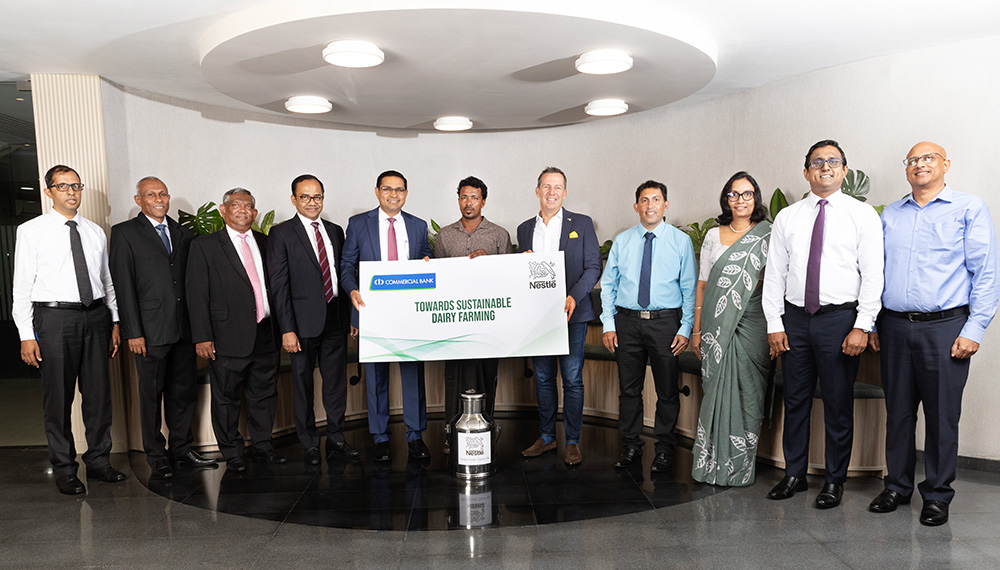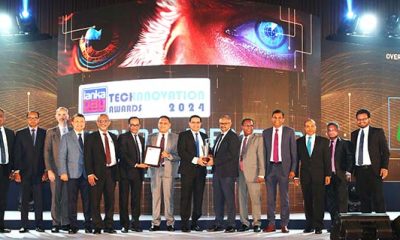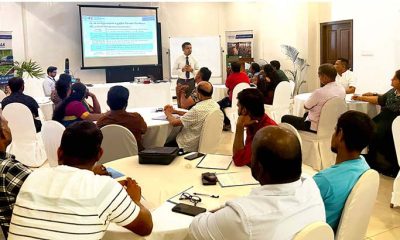Business
Nestlé Lanka partners with Commercial Bank to drive sustainable dairy farming

Nestlé Lanka and the Commercial Bank of Ceylon partnered to launch an initiative to support dairy farmers with concessionary finance to expand their operations and increase milk yield, in line with the purpose of implementing regenerative agricultural practices to reduce greenhouse gas emissions in the dairy value chain.
To support Sri Lankan dairy farmers facilitate the necessary conditions and equipment in their farms to increase yield per cow, Nestlé Lanka formed a partnership with Commercial Bank to put together a value chain financing programme aimed at providing farmers with tailor-made financial solutions at a nominal interest rate. As part of the financing programme, Commercial Bank will also cover community development initiatives such as improving financial literacy and technical awareness of dairy farmers to support in uplifting their livelihoods. Nestlé aims at reaching 300 farmers through the financing programme by year end, from which 25 farmers are selected to benefit from the rollout of the first phase.
“In line with our steadfast commitment towards developing Sri Lanka’s dairy industry, we consistently help our farmer network to build a livelihood that is both profitable and sustainable. We are excited to work closely with the Commercial Bank of Ceylon on this financing programme, to not only support in uplifting the livelihoods of our dairy farmers, but also have a positive impact on the planet. Staying true to our purpose of ‘Unlocking the power of food to enhance quality of life for everyone, today and for generations to come’ we will work together with our partners and dairy farmers as we progress in our ambition of achieving net zero emissions by 2050”, said Bernie Stefan, Managing Director of Nestlé Lanka.
“As the largest private bank in Sri Lanka, Commercial Bank has always recognised the importance of providing inclusive financing solutions to rural communities of Sri Lanka that are mainly engaged in agriculture, livestock and micro businesses. We have set up special Agriculture and Microfinance Units (AMFU) to exclusively cater to this segment. The Bank is in the process of further expanding its AMFU operation to stimulate economic growth and to promote self-sufficiency in agri produce. A supply chain financing programme of this nature involving two highly reputed companies is the best response to the financial exploitation that is prevalent in underbanked and unbanked communities. It can enable these communities to access the formal financial system and be exposed to an environment that is catalytic in building their competitiveness”, said Sanath Manatunge, Managing Director / CEO of the Commercial Bank of Ceylon.
Having operated in Sri Lanka over 115 years, Nestlé supports the livelihoods of over 12,000 dairy farmers through the procurement of milk, contributing significantly to the local milk industry. With a vision of reaching net zero emissions by 2050, the company is committed towards adopting greener practices across the value chain, from farm to table. Driven by its purpose of ‘unlocking the power of food to enhance quality of life for everyone, today and for generations to come’, Nestlé has nourished generations of Sri Lankan families with high quality food and beverages from early childhood to old age.
Business
Seylan Bank posts a remarkable PAT of LKR 10 Bn for 2024

The Bank recorded a Profit before Income Tax (PBT) of LKR 16.04 Bn for the period under review with a 59% growth over the previous year, while recording a Profit after Tax (PAT) of LKR 10.05 Bn for the year with a 61% growth over the previous year, demonstrating a robust performance despite challenging macro-economic conditions. The reported PAT of LKR 10 Bn is the highest performance in the Bank’s 36 year history.
Net Interest Income of the Bank was reported as LKR 37 Bn in 2024 compared to LKR 40 Bn reported in 2023 with a decline of 8% corresponding to reduction in Net Interest Margins during 2024, due to reduction in market interest rates throughout the year.
Net fee and commission income of the Bank reported a growth of 7% to LKR 8 Bn compared to LKR 7.4 Bn reported in the previous year. The growth in 2024 was mainly due to increase in income from Cards, Remittances and other services relating to Lending.
The Bank’s net gains from trading reported a gain of LKR 0.46 Bn, a decrease of 44% over the gain of LKR 0.82 Bn reported in previous year due to exchange / interest rate changes.
Net gains / (losses) from de-recognition of financial assets reported a loss of LKR 0.26 Bn in 2024, compared to the gain of LKR 0.15 Bn reported in the previous year. The loss due to the restructuring of SLISBs amounted to LKR 2.71 Bn and was recorded in Q4 2024.
Other Operating Income of the Bank was reported as LKR 1 Bn in 2024, a growth of 5% over the previous year. This increase is mainly from foreign exchange income, which represents both revaluation gain/ (loss) on the Bank’s net open position and realized exchange gain/ (loss) on foreign currency transactions.
The Bank’s Total Operating Income decreased by 11.6% to LKR 44 Bn in 2024 compared to LKR 49 Bn in the previous year mainly due to decrease in net interest income and the loss on restructuring of SLISBs.
The Bank made impairment provision to capture the changes in the macro economy, credit risk profile of customers and the credit quality of the Bank’s loan portfolio in order to ensure adequacy of provisions recognized in the financial statements. The impairment charge on Loans and Advances and other credit related commitments amounted to LKR 6.6 Bn (2023 – LKR 15.5 Bn). The impairment reversal due to the SLISBs exchange amounted to LKR 4.9 Bn (2023 – LKR 1.5 Bn charge).
(Seylan Bank)
Business
An initiative to bring light into the lives of Galle residents

By Ifham Nizam
For decades, many rural communities in Sri Lanka have struggled with an unreliable power supply, outdated infrastructure, and slow responses from authorities. However, a new initiative aims to change this narrative, bringing hope to thousands in the Galle District who have long been in the dark—both literally and figuratively.
Speaking to The Island Financial Review, Dr. Chathura Welivitiya, CEO of HELP-O, an expert in infrastructure development, emphasizes the importance of this project, stating, “Access to reliable electricity is not just about lighting homes; it is about empowering communities, enabling education, fostering business opportunities, and ensuring overall development.”
He said in many villages, the lack of a stable electricity supply has hindered progress. Residents report frequent power outages, damaged lines left unattended for weeks, and new connections taking months—if not years—to be processed. Such issues have not only inconvenienced households but have also impacted local businesses, schools, and healthcare facilities.
According to a Weligama Municipal Council official: “Our children cannot study at night due to power failures. Businesses suffer because they cannot store perishable goods properly. We have raised complaints multiple times, but the response has been slow.”
Recognizing these challenges, a new project has been launched to address the inefficiencies in power distribution. The initiative includes:
Expansion of the Electrification Network: Efforts to extend power lines to remote areas that still rely on kerosene lamps or battery-operated sources.
Upgrading Infrastructure: Replacement of outdated transformers, damaged poles and weak wiring systems to ensure a stable and safe electricity supply.
Community Engagement: A digital reporting system that allows residents to highlight issues in real time, ensuring faster response and accountability from relevant authorities.
Sustainability Measures: Exploration of renewable energy options, such as solar power, to complement the grid and provide backup solutions for power outages.
Dr. Chathura explains, “This project is not just about fixing wires and poles; it is about creating a sustainable and efficient system that meets the growing energy demands of rural areas. Transparency and community participation are key to its success.”
The Southern Province Governor Bandula Haischandra has voiced strong support for the initiative, recognizing its potential to transform rural communities.
“Ensuring a stable electricity supply is a fundamental responsibility of the government, the Governor told The Island Financial Review. “For too long, these communities have been neglected. We are committed to fast-tracking infrastructure improvements and working closely with relevant authorities to resolve longstanding issues.”
The Governor further emphasized the role of accountability and efficiency in the implementation process. “We cannot afford delays and inefficiencies. With the use of modern technology, we are ensuring that complaints are addressed swiftly and that no village is left behind in development.”
Business
Elpitiya Plantations clinches fourth consecutive victory at Inter Plantation Cricket Tournament

Elpitiya Plantations emerged victorious at the 22nd Inter Plantation Cricket Tournament, organised by the Dimbula Athletic and Cricket Club, held on the 21st and 22nd of February 2025 at the Radella Cricket Ground.
The tournament saw participation from 11 plantation companies, showcasing exceptional talent and sportsmanship. Elpitiya Plantations, led by their dynamic captain Wajira Mannapperuma, demonstrated outstanding performance throughout the tournament.
The winning team from Elpitiya Plantations consisted of Wajira Mannapperuma, Asela Udumulla, Dilukshan Neshan, Lakshan Thenabadu, Kavinda Sulochana, Yasitha Koswaththa, Anushka Baddevithana, Kanishka Ranchagoda, Pramoth Bandara, and Sajith Edirisinghe.
In the semi-final match, Elpitiya faced Horana Plantations PLC and secured a decisive victory by bowling out the Horana team for just 20 runs within 4 overs, paving their way to the finals. The final match was a thrilling encounter against Talawakelle Tea Estates PLC, where Elpitiya’s formidable bowling lineup made it challenging for Talawakelle to score. Within the first four overs, Talawakelle’s top batsmen were back in the pavilion, allowing Elpitiya to clinch the championship title with ease.
This victory marks Elpitiya Plantations’ fifth overall win in the history of the tournament and their fourth consecutive triumph, having previously won in 2022, 2023, and 2024. The team’s consistent performance and dedication have solidified their reputation as a formidable force in plantation cricket.
The management of Elpitiya Plantations extends heartfelt congratulations to the team and expresses gratitude to all the supporters and organisers who made this event a grand success.
-

 Business3 days ago
Business3 days agoSri Lanka’s 1st Culinary Studio opened by The Hungryislander
-

 Sports4 days ago
Sports4 days agoHow Sri Lanka fumbled their Champions Trophy spot
-

 News6 days ago
News6 days agoKiller made three overseas calls while fleeing
-

 News5 days ago
News5 days agoSC notices Power Minister and several others over FR petition alleging govt. set to incur loss exceeding Rs 3bn due to irregular tender
-

 Features4 days ago
Features4 days agoThe Murder of a Journalist
-

 Features4 days ago
Features4 days agoExcellent Budget by AKD, NPP Inexperience is the Government’s Enemy
-

 Sports4 days ago
Sports4 days agoMahinda earn long awaited Tier ‘A’ promotion
-

 News5 days ago
News5 days agoMobile number portability to be introduced in June























